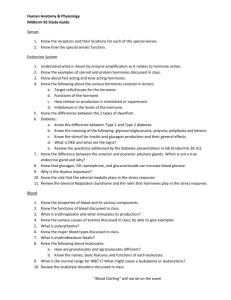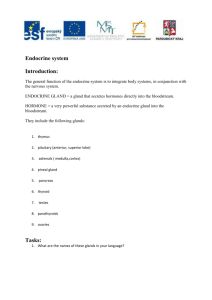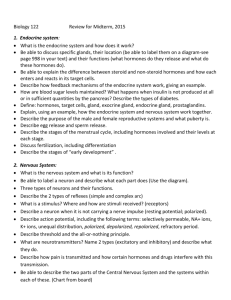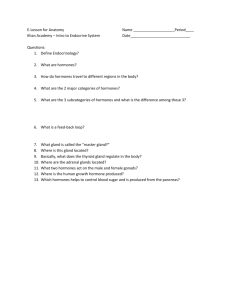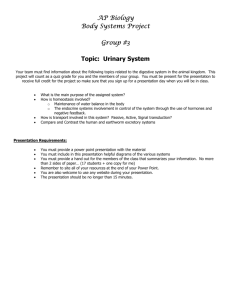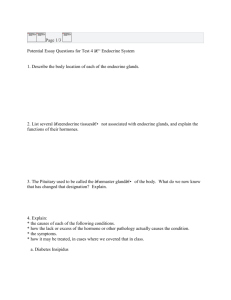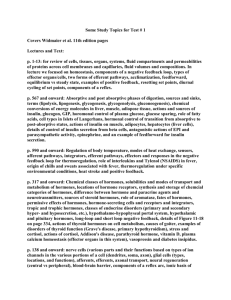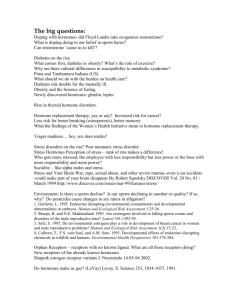Biology 3201 Unit 1 Endocrine System Questions - K-12
advertisement
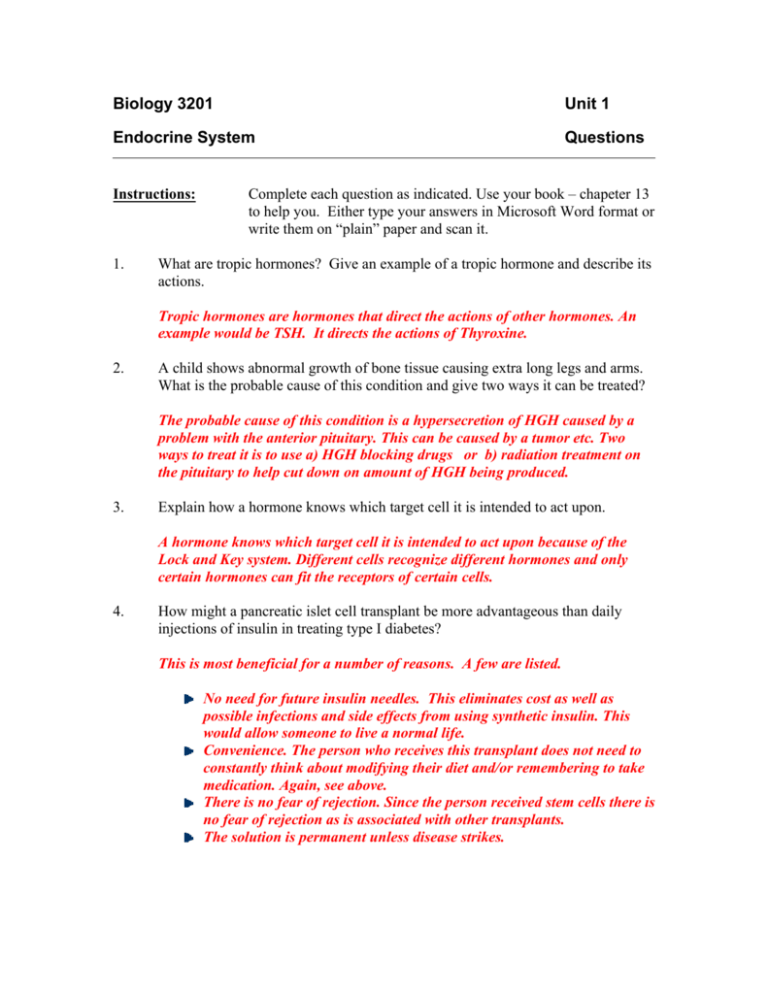
Biology 3201 Unit 1 Endocrine System Questions Instructions: 1. Complete each question as indicated. Use your book – chapeter 13 to help you. Either type your answers in Microsoft Word format or write them on “plain” paper and scan it. What are tropic hormones? Give an example of a tropic hormone and describe its actions. Tropic hormones are hormones that direct the actions of other hormones. An example would be TSH. It directs the actions of Thyroxine. 2. A child shows abnormal growth of bone tissue causing extra long legs and arms. What is the probable cause of this condition and give two ways it can be treated? The probable cause of this condition is a hypersecretion of HGH caused by a problem with the anterior pituitary. This can be caused by a tumor etc. Two ways to treat it is to use a) HGH blocking drugs or b) radiation treatment on the pituitary to help cut down on amount of HGH being produced. 3. Explain how a hormone knows which target cell it is intended to act upon. A hormone knows which target cell it is intended to act upon because of the Lock and Key system. Different cells recognize different hormones and only certain hormones can fit the receptors of certain cells. 4. How might a pancreatic islet cell transplant be more advantageous than daily injections of insulin in treating type I diabetes? This is most beneficial for a number of reasons. A few are listed. No need for future insulin needles. This eliminates cost as well as possible infections and side effects from using synthetic insulin. This would allow someone to live a normal life. Convenience. The person who receives this transplant does not need to constantly think about modifying their diet and/or remembering to take medication. Again, see above. There is no fear of rejection. Since the person received stem cells there is no fear of rejection as is associated with other transplants. The solution is permanent unless disease strikes. 5. In what three ways does the response of a nerve differ from the response of a hormone? They differ in the following ways: Speed of Response Type of Response Duration of Response 6. Nervous System Very Fast Electrical Short Endocrine System Slow Acting Chemical Long How is solubility of steroid hormones related to their function? The solubility of a hormone relates to its function in that it either dictates whether the action of the hormone is carried out on the surface or inside a cell. In the case of steroid hormones, they are soluble in the cell membrane. This allows them to pass directly into the cell where the hormone is able to carry out its function. Non-steroid hormones are unable to dissolve in fat and cannot cross the cell membrane. Because they cannot cross the cell membrane the site of their action is located on the surface of a cell only. 7. Define Hormone and Target Cell. Hormone Æ A chemical messenger found within the blood stream of the endocrine system. Hormones are either steroid or non-steroid in nature. Target cell Æ The cell on which a hormone carries out its action. 8. Compare exocrine glands with endocrine glands. Exocrine glands are glands that have ducts. Hormones are secreted into these ducts from the gland. Endocrine glands are “ductless” glands. Hormones from the gland are dumped directly into the blood. 9. Explain the differences in the way non-steroid hormones and steroid hormones carry out their actions. Steroid hormones carry out their actions by passing through the cell membrane. When they pass through the cell membrane they bind with a protein receptor complex within the cytoplasm. The hormone-receptor complex then travels to and enters the nucleus. The complex causes a gene in the DNA to create an enzyme that carries out several other reactions within the cell. Nonsteroid hormones carry out their action on the surface of cells. When these hormones reach the surface of cells they bind with the receptor. A hormone receptor complex is created. This complex immediately causes the conversion of ATP into cAMP. cAMP then causes a cascade of reactions within the cytoplasm of the cell. 10. How do feedback mechanisms help maintain homeostasis? Feedback mechanisms help maintain homeostasis by trying to return the bodies systems back to a normal range. For example, normal blood glucose levels are between 75 – 100 mg/ml of blood. Whenever blood sugar levels rise or fall below this normal range, the body responds to correct the imbalance and return it to normal. This is what homeostasis is all about. 11. Explain why glucagon and insulin are antagonistic hormones. Glucagon and Insulin are antagonistic hormones because they carry out opposite effects in the body. Insulin lowers blood sugar levels while glucagons raises blood sugar levels. 12. What is the function of the endocrine system? The endocrine system acts as a control system in order to maintain homeostasis. The endocrine system uses slow acting, long lasting chemical messengers known as hormones to respond to stimuli. The purpose is to maintain a stable internal environment in the human organism. 13. Explain why the pineal gland is considered the "biological clock" of the body and why the pituitary gland is considered the "master gland" of the body. The pineal gland is considered the biological clock of the body because it secretes Melatonin. Melatonin is responsible for telling the body when to go to sleep or wakeup. If there is a lot of melatonin in the blood, this signals the brain to go to sleep and vice versa. The pituitary is considered the master gland because it secretes many hormones and these hormones work to control several other glands/organs within the human body. 14. Describe the malfunctions that cause Type I and Type II diabetes. The malfunctions that cause Type 1 diabetes is the beta cells located within the Islets of Langerhans of the Pancreas. In this case the beta cells have stopped producing insulin. This results in high amounts of glucose in the blood because insulin is needed in order to convert the glucose in the blood into glycogen. Type II diabetics have a malfunction where their cells are unable to recognize the insulin being made by the pancreas. As such, high amounts of glucose remains in the blood because the cells are unable to use it. 15. Explain the role of Adrenaline in relation to short term stress. Adrenaline works with the sympathetic nervous system to prepare the body for emergencies by doing the following: a. Increasing heart rate. b. increasing breathing rate c. shuts down digestion d. increases conversion of glycogen into glucose (liver does this) e. dilates pupils 16. Describe the role Banting and Best played in the discovery of Insulin. Banting and Best worked together and discovered Insulin. Banting discovered that certain cells within a pancreas called Islet cells were the key to helping organisms use glucose found in the blood. These cells were discovered to help a person from getting diabetes. Banting and Best worked together on dogs to extract secretions from islet cells of healthy dogs and use it to treat dogs that had diabetes. They discovered that dogs having diabetes could be treated with secretions from dogs without diabetes. They eventually purified the extract and tested humans. They called the extract insulin and it is used today to treat diabetics the world over.
